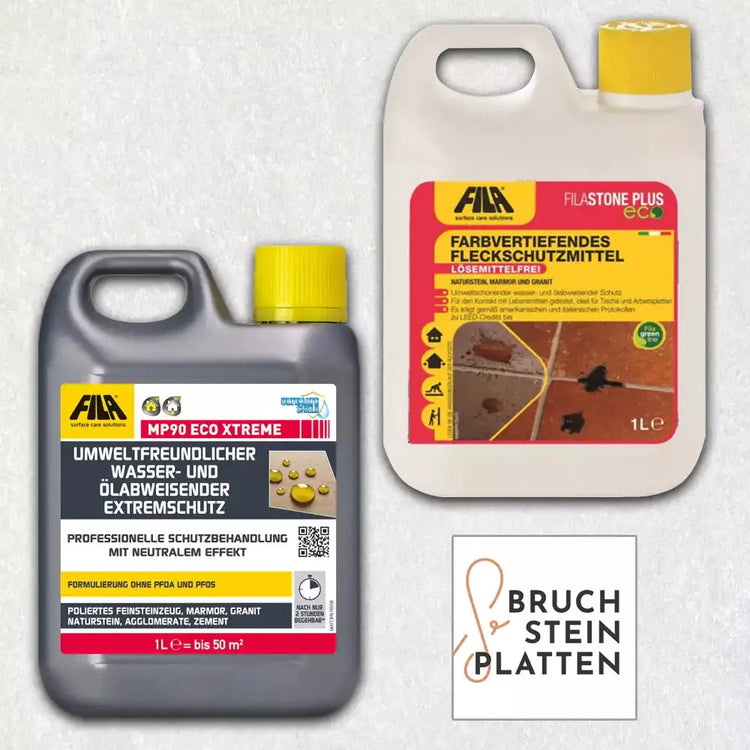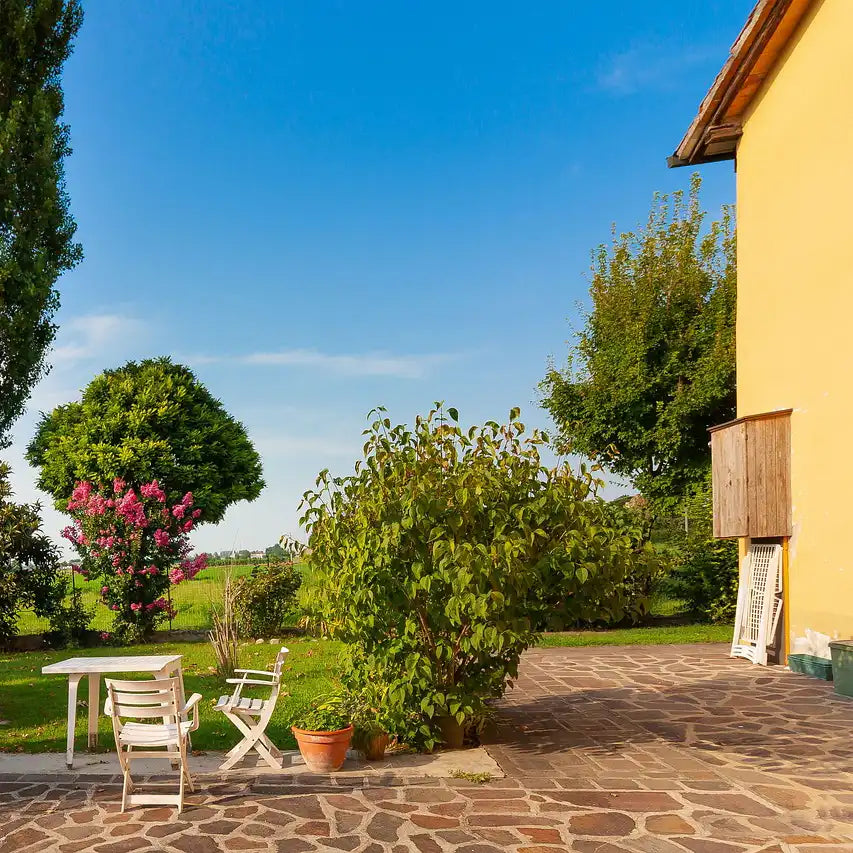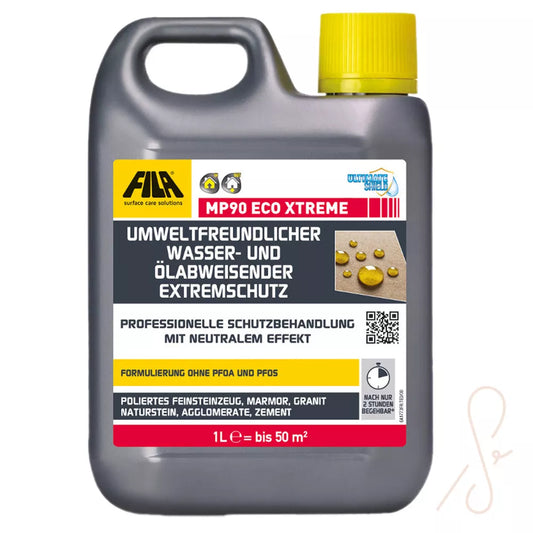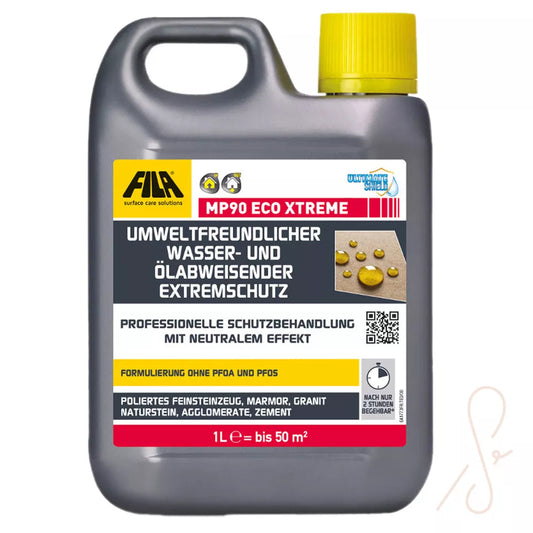
Collection: Natural stone impregnation
Protect your polygonal natural stones with the right impregnation
Protecting broken stone slabs is important to maintain their longevity and beauty. Therefore, it is essential to protect quartzite, slate, and graywacke stones, especially outdoors. Impregnation helps to shield the stone surface from dirt, stains, and wear and tear, or to maintain its appearance. There are different types of natural stone impregnations that can be selected depending on the material and intended use. In general, impregnation protects against water, oil, grease, and other liquids. Some impregnations even protect against mold and fungal infestation. To choose the right impregnation, it may be useful to consult a specialist. They can help you choose the right impregnation for your stones, depending on their characteristics, location, and purpose. They can also help you determine if impregnation is necessary.

From Monday to Friday, our employees are available as contact persons from 8 a.m. to 4 p.m. with pleasure. Phone: +49 (0)3332 26 70 78 27 You can also ask your questions by e-mail. We will respond as soon as possible. verkauf@bruchsteinplatten.de

Our natural stone impregnations are solvent-free
The impregnations offered by bruchsteinplatten.de are water-based and do not contain any harmful chemicals that could harm the environment. They are also biodegradable and do not cause any harm to the environment. Our products provide stain protection for the stone surface, come in a one-liter bottle, and are suitable for porcelain stoneware, natural stone slabs as protective treatment. We highly recommend using stone impregnation. By treating the impregnated surface with products like FILA Stone Plus Eco, you ensure a long-lasting beautiful natural stone surface.
This is how impregnation of rubble stones works
To protect natural stones, it is recommended to impregnate them. The product is simply applied to the clean, dry surface and immediately absorbed. This reduces the stone's absorbency and liquids will remain on the surface thanks to the so-called nano-effect (also known as the lotus effect). It is best to impregnate polygonal slabs after laying them, but before grouting, as this makes it easier to remove residues of grout. It is important to note that impregnation is not the same as sealing. While impregnation penetrates, sealing forms a protective film on the surface.
Impregnation repels dirt and protects the flooring in outdoor areas, such as your favorite corner on your terrace and in the garden. Our recommendation: Always impregnate, for optimal protection cover the entire outer surface of the stone to shield it from external influences such as dripping grill fat. Nice side effect: Maintenance and cleaning become a bit easier, as less dirt and other residues can accumulate.
Impregnation of polygonal slabs - Color intensifying or natural effect?
Our impregnations are the perfect solution to treat rubble stone slabs in driveways, terraces, or pathways and protect them from damage. Even robust rubble stone slabs require a protective coating to last as long as possible. An impregnation applies a preventive protective layer and reduces maintenance effort at the same time. You can choose between a color-enhancing or a natural effect impregnation. The color-enhancing impregnation provides about a 20% stronger color contrast, while the natural effect impregnation keeps the colors unchanged and preserves the shine and quartz glimmer.
-
Impregnation natural effect
Vendor:FILA SolutionsRegular price €98,77 EURRegular priceUnit price €3,29/m² -
Impregnation Color Intensifying
Vendor:FILA SolutionsRegular price €98,77 EURRegular priceUnit price €3,29/m² -
Natural stone impregnation
Vendor:FILA SolutionsRegular price €98,77 EURRegular price

Protect natural stones from damage by impregnating
Application, Effect, and Treatment of Individual Stones
To protect items that are important to us from damage, it is recommended to impregnate them so that they retain their unique character for a long time. Thanks to the nano-effect, it is made difficult for impurities to penetrate the stone. They more or less bead off. In contrast to sealing, the stone will not shine after a Nature Effect Impregnation and there will be no "wet effect", so the colors of the stone will be preserved. Minor changes to the surface, however, are normal.
Tip: If you are unsure, it is recommended to test on a small area beforehand.
FAQ - Answers to frequently asked questions about impregnation and protection of natural stones
When should natural stones be impregnated?
After laying the stones, it is recommended to regularly impregnate them to protect them from contamination and moisture. The impregnation should be carried out at regular intervals to ensure protection. The frequency of impregnation depends on how heavily or frequently the surfaces are used and therefore stressed. For heavy usage, we recommend annual impregnation, otherwise every 2-3 years should be sufficient. Our staff are available as contact persons from Monday to Friday between 8 am and 4 pm. Phone: +49 (0)3332 26 70 78 27 You can also send your questions via email. We will respond as soon as possible. verkauf@bruchsteinplatten.de
Seal natural stone or impregnate natural stone?
It is important to note that sealing natural stone and impregnating natural stone are different processes. If you truly want to create a durable surface, it is best to use both methods. Sealing involves permanently coating the stone with a protective layer that shields it from dirt and wear. In contrast, impregnating the stone is done to protect it from moisture. This process provides additional protection against mold and other damages caused by water. Both processes are extremely important in maintaining the longevity and value of your natural stone. It is best to apply both methods to create a long-lasting and protective surface.
Patio slabs - outside: Impregnate or seal?
Why should you impregnate natural stone?
Protective impregnation of natural stone gives the stone a more durable surface that repels dirt, splashes, and moisture. This helps the stone last longer and maintain its appearance and color. Impregnations help prevent decay and damage from extreme temperatures and chemicals.
How can discoloration and stains on granite be prevented?
How does the impregnation protect the natural stone?
The impregnation protects the natural stone from moisture and stains by forming a water-repellent layer that seals the stone pores. This prevents moisture from penetrating and dirt and stains from adhering. This also extends the lifespan of the polygonal slabs.
When should one refrain from sealing terrace tiles?
One should refrain from sealing terrace tiles if they are made of natural, untreated materials such as stone or concrete. These tiles have good natural water resistance and are therefore already protected from weather influences. However, we recommend applying an impregnation in general, as it provides additional protection and significantly facilitates subsequent maintenance.
What are the benefits of sealing or impregnating?
Is natural stone not sensitive to scratches and stains?
Yes, natural stones are more or less susceptible to scratches and stains. Depending on the type of stone and its surface, for example, Schiefer Negra is naturally more sensitive than other natural stones. A rather smooth and uniform surface can also be damaged by aggressive cleaning agents or sharp objects. Therefore, it is important to ensure that the natural stone is regularly cleaned and protected to preserve it from scratches and stains. You will receive detailed advice here: Our staff are available as contact persons from Monday to Friday between 8 am and 4 pm. Phone: +49 (0)3332 26 70 78 27 You can also ask your questions by email. We will respond as soon as possible. verkauf@bruchsteinplatten.de
Are there typical application errors when impregnating natural stone terrace tiles?
Typical application errors when impregnating natural stone terrace tiles include:
- Using too little impregnating agent or applying it incorrectly to a damp surface
- Using an impregnating agent that is not designed for natural stone
- Using an impregnating agent that is not tailored to the type of natural stone (e.g. sandstone or granite)
- Inadequate removal of dirt and/or impurities before impregnation
- Inadequate drying of the natural stone before impregnation
How often should natural stone be impregnated?
How to care for natural stone?
Natural stone care is a very important topic, as natural stone is a naturally occurring material that can be susceptible to damage and wear depending on the type of rock. Regular cleaning and maintenance are key to longevity and preventing damage. Different cleaning and care methods may be required depending on the type of natural stone. Generally recommended cleaning measures include:
- Use gentle cleaning agents and water
- Remove stains and dirt immediately
- Minimize grinding and polishing
- Perform regular maintenance and repairs
When should I use color-enhancing impregnations?
Color-enhancing impregnations are used to intensify the color tone and appearance of a specific material. They are commonly used for wood, leather, stones, and other natural materials to achieve a deeper, richer look. They can also be used to alter the color tone of paints and varnishes by helping to introduce the color into the pores of the material and thus deepen it literally.
How is the impregnating agent processed?
Impregnating agents are usually applied to the surface of a material by spraying, pouring, brushing, dipping, or immersing to protect it from dirt, moisture, pests, or other harmful influences. After application, the agent is typically left on the surface for some time to allow it to penetrate or be absorbed, and then washed off to remove any excess liquid that may be present.
With what should the surface be cleaned before applying the impregnation?
COMPRESA - Premium quality. Everything included at an affordable package price. Free delivery to your doorstep.
Choose your desired color for the joint and the desired impregnation (Nature Effect or color intensifying). All necessary materials such as polygonal slabs including 10% extra, binder, quartz gravel, color quartz, and impregnation are already included in this all-inclusive package.




